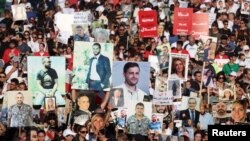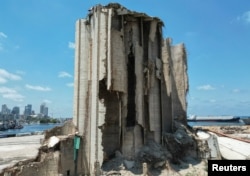As Lebanon remembered its catastrophic Beirut port blast of three years ago Friday, observers say a culture of impunity has taken hold in the country, with no one held accountable for crimes, including the banking crisis that led to the financial collapse.
Improperly stored ammonium nitrate at the Beirut port exploded on Aug. 4, 2020, killing more than 215 people and wounding some 7,000, while leaving swaths of the Lebanese capital in ruins. It was one of the biggest non-nuclear explosions in history and yet no one has been held to account and politicians have pressured the judiciary to suspend the probe.
The explosion struck amid Lebanon's dire economic collapse dubbed by the World Bank as one of the worst ever, with its currency devalued by 98 percent against the dollar. Lebanese accuse the governing elite and the three-decade tenured central bank governor of corruption and mismanagement.
This week, Human Rights Watch, Amnesty International and some 300 organizations and individuals again urged the United Nations to establish a probe into the explosion, which political leaders have repeatedly rejected.
"International action is needed to break the culture of impunity in Lebanon," Ramzi Kaiss said in a Human Rights Watch statement.
Randa Slim of the Washington-based Middle East Institute agrees that very little seems to move the political elite, including the powerful Iran-backed Hezbollah, whether it be the horrific blast or the tanking economy.
"Sanctions have not worked in Lebanon," she told an online audience at the Wilson Center in Washington. "They have not changed the behavior of the parties, including Hezbollah. The other tool is public pressure. That public pressure today has disappeared or it's very reduced. I thought the economic crisis would be that kind of incentive for change. We have a normalization of the crisis."
Slim sees an intervention by the regional and international community as the only way to change the incentive structure of Lebanon's rulers. Mona Yacoubian of the U.S. Institute for Peace pushed for a "much more consistent, high-level engagement on Lebanon."
"We need coordinated U.S., French, Gulf Arab targeted asset freezes and travel bans on all those who are obstructing the progress toward the election of a president who will serve Lebanon's interest and will begin to put the country back on a path of stability," Yacoubian said.
Lebanon has been without a president for the past nine months, leaving a caretaker prime minister and cabinet unable to tackle its worst economic crisis or deal with other pending security leadership vacancies.












